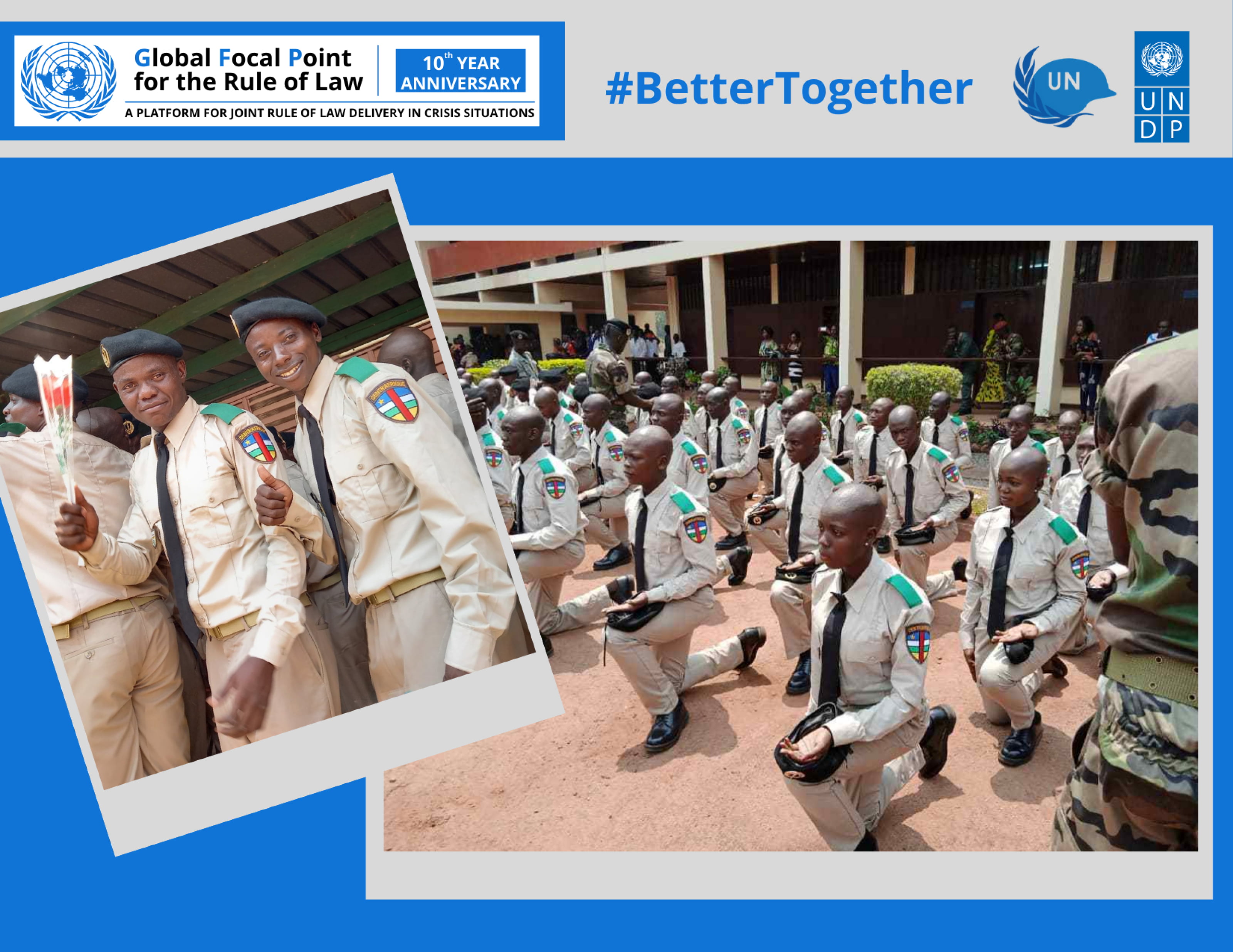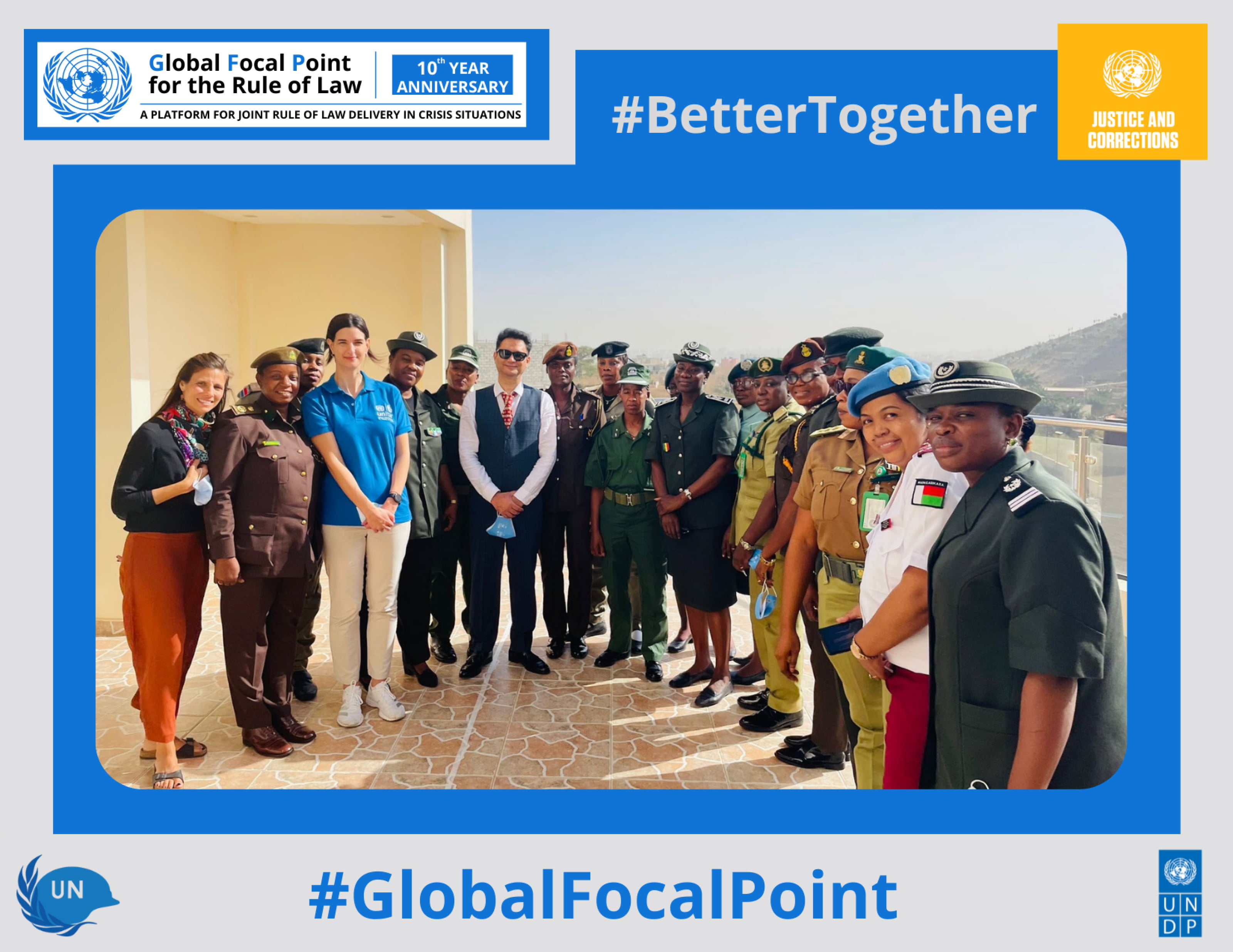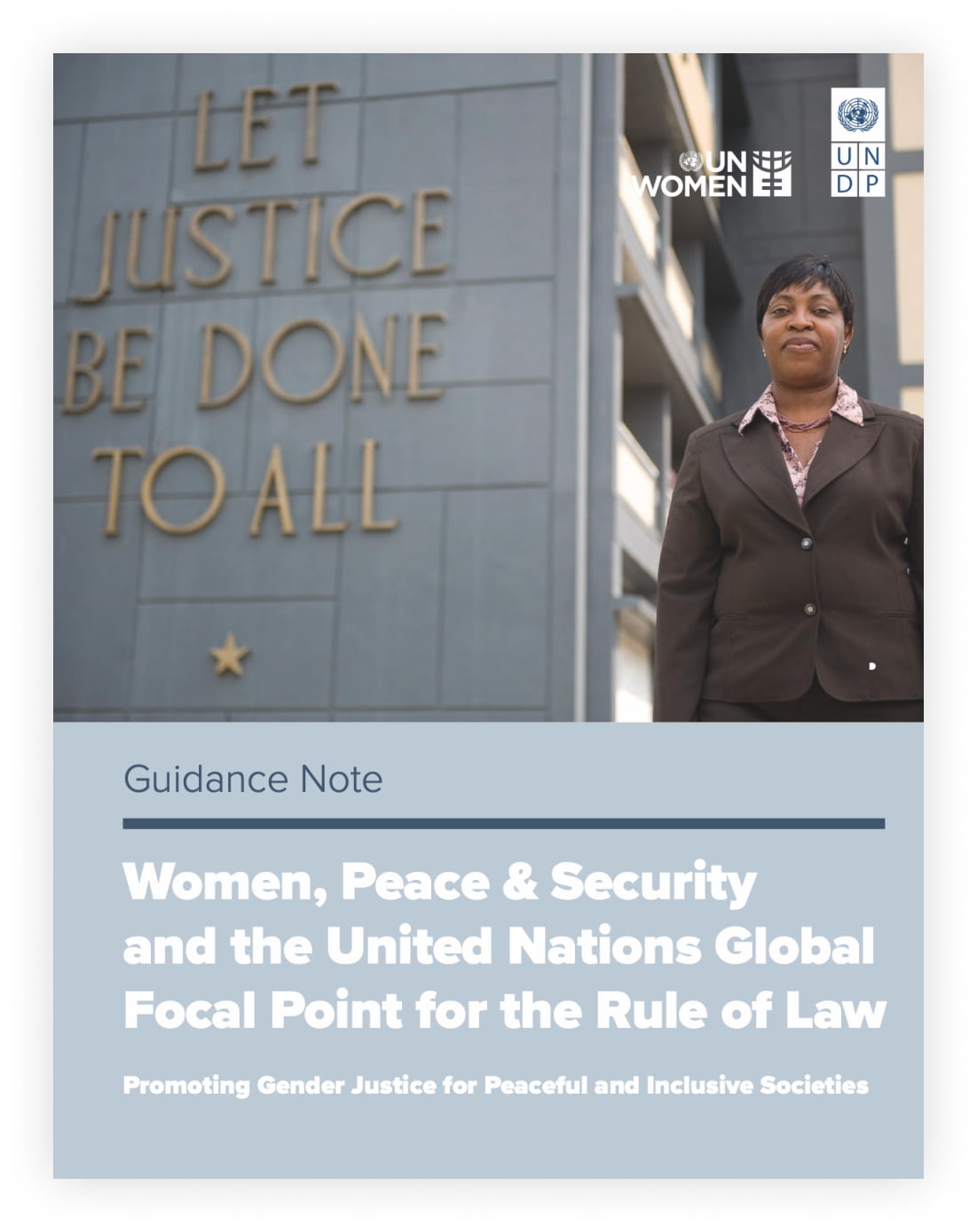Global Focal Point for the Rule of Law


Overview
2022 marked ten years since the establishment of the UN Global Focal Point for the Rule of Law (GFP), a joint arrangement for delivery of the rule of law in fragile settings. Co-chaired by UNDP and the UN Department of Peace Operations (DPO), GFP reinforces the One-UN approach at the global and national levels to address violent conflicts, protect human rights and restore justice and security for people affected by crisis and conflict. Since 2012, GFP has coordinated joint work and delivery in over 30 countries worldwide. Over 160 missions and experts were deployed to provide expertise and conduct joint assessments. Since 2016, more than US$50 million was mobilized for joint rule of law assistance through the GFP framework.

GFP: country and policy highlights
In 2022, the GFP delivered catalytic funding and technical expertise to joint rule of law programming in the Central African Republic (CAR), the Democratic Republic of the Congo (DRC), Haiti, Libya, Mali, Somalia and Sudan.
In CAR, fighting impunity remained the priority of the Joint Rule of Law Programme. The Special Criminal Court delivered its first verdict in 2022. Three combatants were found guilty of war crimes and crimes against humanity, including sexual violence, for their role in the massacre of at least 46 civilians in 2019.
In Haiti, UNDP and the UN Integrated Office in Haiti (BINUH) established a new basket fund to support the Haitian National Police (HNP) in fighting crime and addressing the issue of proliferation and heightened activity of criminal groups. A police intelligence data centre was established with branches in ten areas of the country where the police officers received necessary equipment.
In Niger, under the leadership of the UN Resident Coordinator’s Office and due to the joint support provided by UNDP and the Office of Rule of Law and Security Institutions (OROLSI), UNDP and OHCHR launched a new Joint Flagship Programme on Access to Justice and Human Rights. The programme will be implemented in 2023-2027 by nine UN agencies to promote and protect fundamental rights and freedoms, ensure equal access to justice for all and strengthen the rule of law in Niger.


In DRC, the Joint Police Reform Support Programme benefitted from the GFP framework and support while working with the Congolese National Police and implementing initiatives to improve its institutional knowledge and investigative capacity.
In 2022, 12 expert deployments and assessment missions took place under the GFP framework. These included multi-agency missions to conduct a strategic assessment of the justice and security sectors in São Tomé-et-Principe, providing elections security in Sierra Leone and reviewing policy manuals of the Lesotho corrections service.
To mainstream the Women, Peace and Security (WPS) agenda in the rule of law programming across the UN rule of law system, GFP published the report "Women, Peace & Security and GFP: Promoting Gender Justice for Peaceful and Inclusive Societies". Developed through the Gender Justice Platform, the report provides recommendations on leveraging joint UN rule of law assistance and advancing gender equality in crisis-affected settings.
GFP continued to convene its partners for rule of law consultations to discuss latest developments and ensure a more efficient joint response to arising challenges.
GFP beneficiaries, partners and chairs spoke about its achievements and perspectives at the high-level event marking the GFP’s 10th anniversary
“GFP’s achievements clearly highlighted that rule of law support was more impactful through collaboration among UN agencies, governments, and civil society”
Achim Steiner, UNDP Administrator.
“DPO has embraced the GFP as an effective mechanism to achieve greater collaboration with UNDP counterparts – as well as with all other GFP Partners – and to amplify the impact of the United Nations engagement in the area of the rule of law in peace operations, including in CAR, DRC, Haiti, Mali, Somalia, Sudan and South Sudan”
Jean-Pierre Lacroix, Under-Secretary-General for Peace Operations, UN Department of Peace Operations.
“GFP is a strong example of UN coordination among different agencies to deliver results, develop a vision and longer-term strategies to implement in a joint manner”
Yoka Brandt, Permanent Representative of the Kingdom of the Netherlands at the Ministry of Foreign Affairs of the Netherlands.
“GFP in Somalia is one of the best examples of UN’s joint efforts in support of the rule of law”
Anita Kiki Gbeho, Deputy Joint Special Representative of the UN Mission in Somalia.
Lessons learned
Over the course of the past ten years, the GFP has served as a successful flexible coordination arrangement that brings together UNDP Country Offices, UN missions and other actors within the UN rule of law system. By leveraging comparative advantages of different parts of the organization, GFP has allowed the UN to provide tailored joint assistance in line with the One-UN approach. Through joint engagements, the UN becomes better positioned to apply a holistic and sector-wide approach to the rule of law and provide workable people-centred solutions to individuals and communities.
Looking forward
In line with the Secretary-General’s New Vision for the Rule of Law, GFP will continue to serve as the main coordination mechanism for the UN rule of law system. Furthermore, based on the lessons learned from the past, at the country level GFP will strengthen its links with senior UN leadership in both mission and non-mission settings to ensure political support and coordinated rule of law interventions, and promote joint rule of law programming.
The New Vision for the Rule of Law
In May 2022, the United Nations adopted the New Vision for the Rule of Law, as mandated by Our Common Agenda. The New Vision for the Rule of Law recognizes the fundamental importance of the rule of law as the basis for multilateral cooperation and political dialogue, underlines the importance of people-centred rule of law in achieving the SDGs and calls on all stakeholders to take an active role in the rule of law promotion.
The Secretariat of the UN Global Focal Point for the Rule of Law was delegated to coordinating the development of the New Vision for the Rule of Law together with Rule of Law Unit of the Executive Office of the Secretary-General and Office of Legal Affairs (OLA).
The New Vision has called for revitalizing the Rule of Law Resource and Coordination Group (ROLCRG) as a platform for high-level discussions on the rule of law. GFP will continue to fulfill its function as the operational and programmatic coordinator of the New Vision realization while ensuring the connection between senior-level strategic dialogue and the UN rule of law engagement at the country-level.
The GFP network of partners includes UN Women, the UN Human Rights Office (OHCHR), the UN Office on Drugs and Crime, the Peacebuilding Support Office (PBSO), the Department of Political and Peacebuilding Affairs (DPPA), the UN High Commissioner for Refugees (UNHCR), UNICEF, the UN Office for Project Services (UNOPS) and the UN Team of Experts on Rule of Law and Sexual Violence in Conflict.
The Special Criminal Court mandated to investigate, prosecute and judge serious human rights violations, along with grave breaches of international criminal and humanitarian law is supported through a joint rule of law programme implemented by MINUSCA and UNDP CAR under the framework of the Global Focal Point for the Rule of Law (GFP).

